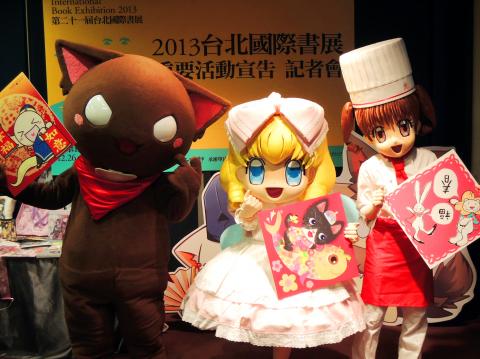The pavilion for children’s books at the upcoming Taipei International Book Exhibition will have the theme of Thomas and Friends, a well-known British children’s television series, the organizers said yesterday.
The pavilion will have a giant inflatable castle featuring Thomas the Tank Engine, the series’ main character, the organizers said at a news conference.
“This will be the first time Thomas and Friends has been incorporated in an international book fair,” the organizers said.

Photo: Chen Yi-ching, Taipei Times
Visitors to the exhibition will also be able to play with toys inspired by the British cartoon and watch a series of related movies, the organizers added.
In addition to books from countries such as Belgium, the pavilion will showcase illustrated books by Taiwanese authors such as Jimmy Liao (幾米), director of the Taiwan Book Fair Foundation Huang Pao-ping (黃寶萍) said.
Now in its 21st year, the exhibition, one of Asia’s major book fairs, will run from Wednesday next week through Feb. 4 at the Taipei World Trade Center.
This year’s fair has received over 800 registrations by publishers, while 500 writers from home and abroad are also expected to attend.
Last year the fair attracted a record number of 600,000 visitors.

To many, Tatu City on the outskirts of Nairobi looks like a success. The first city entirely built by a private company to be operational in east Africa, with about 25,000 people living and working there, it accounts for about two-thirds of all foreign investment in Kenya. Its low-tax status has attracted more than 100 businesses including Heineken, coffee brand Dormans, and the biggest call-center and cold-chain transport firms in the region. However, to some local politicians, Tatu City has looked more like a target for extortion. A parade of governors have demanded land worth millions of dollars in exchange

An Indonesian animated movie is smashing regional box office records and could be set for wider success as it prepares to open beyond the Southeast Asian archipelago’s silver screens. Jumbo — a film based on the adventures of main character, Don, a large orphaned Indonesian boy facing bullying at school — last month became the highest-grossing Southeast Asian animated film, raking in more than US$8 million. Released at the end of March to coincide with the Eid holidays after the Islamic fasting month of Ramadan, the movie has hit 8 million ticket sales, the third-highest in Indonesian cinema history, Film

Taiwan Semiconductor Manufacturing Co’s (TSMC, 台積電) revenue jumped 48 percent last month, underscoring how electronics firms scrambled to acquire essential components before global tariffs took effect. The main chipmaker for Apple Inc and Nvidia Corp reported monthly sales of NT$349.6 billion (US$11.6 billion). That compares with the average analysts’ estimate for a 38 percent rise in second-quarter revenue. US President Donald Trump’s trade war is prompting economists to retool GDP forecasts worldwide, casting doubt over the outlook for everything from iPhone demand to computing and datacenter construction. However, TSMC — a barometer for global tech spending given its central role in the

Alchip Technologies Ltd (世芯), an application-specific integrated circuit (ASIC) designer specializing in server chips, expects revenue to decline this year due to sagging demand for 5-nanometer artificial intelligence (AI) chips from a North America-based major customer, a company executive said yesterday. That would be the first contraction in revenue for Alchip as it has been enjoying strong revenue growth over the past few years, benefiting from cloud-service providers’ moves to reduce dependence on Nvidia Corp’s expensive AI chips by building their own AI accelerator by outsourcing chip design. The 5-nanometer chip was supposed to be a new growth engine as the lifecycle